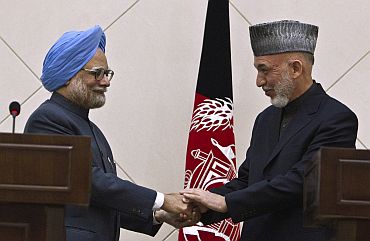 In his long overdue visit to Afghanistan, Prime Minister Manmohan Singh and Afghanistan President Hamid Karzai bonded as expected, but both sides played it safe.
In his long overdue visit to Afghanistan, Prime Minister Manmohan Singh and Afghanistan President Hamid Karzai bonded as expected, but both sides played it safe.
Wahid Omar, official spokesperson of President Karzai, told rediff.com, "The visit was an expression of solidarity between the two countries."
"Importantly," he also said, "Both the sides have agreed that Pakistan's concerns have to be taken on board and it cannot be isolated."
However, both the leaders, acutely aware of the security concerns and inherent limitations in expanding the relation due to the 'Pakistan factor', were not lacking in warmth and mutual understanding.
As a step forward, both the sides have expressed willingness to start strategic dialogue to 'define and document' mutual interests, said Omar.
He said very soon the national security advisors from both sides would meet.
PM Singh's two-day Kabul visit is welcomed by people and top leadership in Afghanistan.
The warmth amongst Afghans for Indians and the appreciation for Indian government's attempts in helping rebuild that country just can't be missed in Kabul.
Even though Japan and many other countries are donating much more to rebuild Afghanistan, the deep ancient ties between India and Afghanistan create an unmatched aura.
Karzai's cabinet was present in full strength to welcome Dr Singh. On the other hand, Manmohan Singh was accompanied by National Security Advisor Shivshankar Menon, Special Envoy to Afghanistan S K Lambah and Foreign Secretary Nirupama Rao.
The local media too were creating a buzz around this visit by mentioning that Dr Singh would be staying overnight in the presidential palace, while Pakistan's top leadership comes in a business-like visit for few hours only.
However, there was a telling moment on Thursday evening at the joint press conference when most of the questions from media were related to Pakistan.
Interestingly, when a journalist asked Dr Singh about the possibility of American-type operation inside Pakistan to hunt down terrorists, he refused to talk about the matter in public, and simply said, "India is not America."
Prime Minister Manmohan Singh was conservative in his responses, as he remained quite cool throughout the joint press conference.
But Karzai, who is facing tough realties, abruptly ended the ongoing question-answer session when the turn of Indian media came once again.
Probably Karzai doesn't want to talk much about Pakistan in the presence of the Indian PM.
The joint statement released after a high-level meeting was on the predictable lines that acknowledged ancient and historic ties and India's aid to the troubled country.
It also 'underlined their shared commitment to combating terrorism that threatens both the countries as well as the region and the world as a whole. The two leaders shared their vision of Afghanistan as an independent, democratic, stable and prosperous country.'
In a low-key but important announcement , 'the two sides also agreed that an important part of their strategic partnership would be cooperation in the area of security, law enforcement and justice, including an enhanced focus on cooperation in the fight against international terrorism, organised crime, and illegal trafficking in narcotics, and money-laundering."
The mention of 'co-operation' in the area of security is believed to be related to the much-discussed training of Afghan police officials in India. Afghan police needs training for not just maintaining law and order but it needs the 'military element' too, said sources from the Indian side.
Rangin Dadfar Spanta, President Karzai's national security advisor, told rediff.com, "India and Afghanistan remain best friends. We are not worried about withdrawal of foreign troops because one day they have to go."
Wahid Omar also said, "All the countries clearly know that the Taliban will never be in power again. And we have convergence of views on this issue."
Image: Afghan President Karzai shakes hands with PM Singh during a news conference in Kabul on Thursday
Photograph: Ahmad Masood/Reuters







 © 2025
© 2025